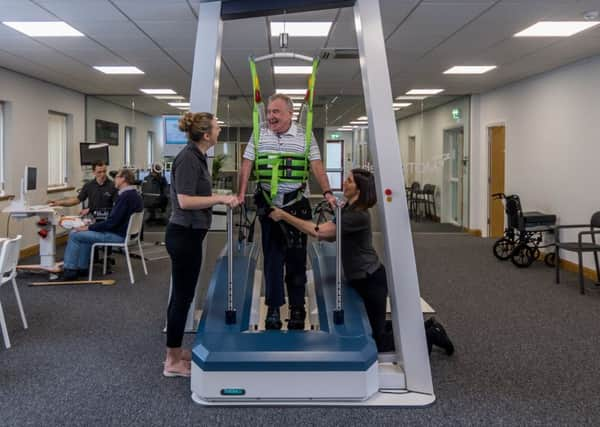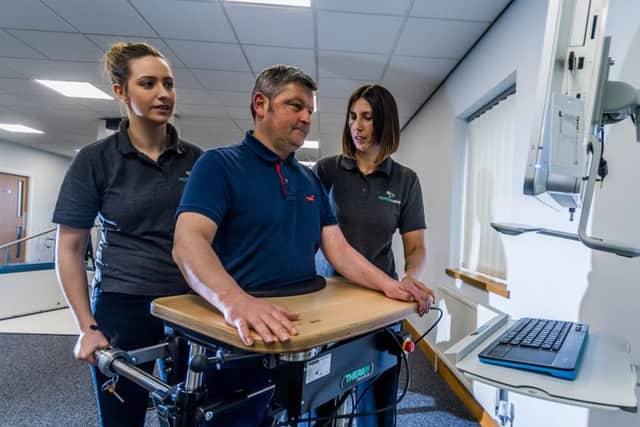Unique brain rehabilitation centre opens near Leeds to offer new hope to disabled patients


Most people would think nothing of walking 135 steps, but for the usually wheelchair-bound Alf Limb completing such a distance is his equivalent of successfully running a marathon. The 77-year-old former butcher is one of the patients of a new neuro rehabilitation centre in Yorkshire which is using state-of-the-art robotics and virtual reality technology to offer fresh hope to people whose lives have been dramatically restricted by the often-sudden onset of disability.
Before the pioneering new facility - the only one of its kind in the UK and run by a company called MOTIONrehab - opened this week at a business park in Morley, Alf was only able to manage a few steps across his living room on a zimmer frame, with the support of a physiotherapist and his wife Judith following immediately behind with his wheelchair should he fall over.
Advertisement
Hide AdAdvertisement
Hide AdBut in his two attempts on a ‘robotic gait trainer’ called Lyra at the facility this week, Alf has managed to do the equivalent of well over 100m each time - far outstripping what he has previously been able to achieve. The machine works by holding feet in place on mobile foot plates to replicate natural walking patterns. The result is that users are able to make up to 40 times as many steps compared to treadmill training or manual walking practice.


“It is amazing really,” he tells The Yorkshire Post at the official opening of the centre on Thursday morning. “I wouldn’t be doing much more than 12 steps per week and now I have just done 135 steps on the machine this morning.”
Alf, from Crofton near Wakefield, contracted polio as a seven-year-old. “I made quite a good recovery,” he says. “I walked out of hospital and a lot of the others who were in there with me came out in wheelchairs so I considered myself quite lucky.”
He managed a full working life, first as a butcher and then in a plastics factory, before eventually retiring. However, in 2010 problems began when a knee replacement went badly wrong and resulted in him relying on an uncomfortable caliper. After five years, he upgraded it for what should have been a superior carbon fibre version. But the way in which it altered the way he walked - combined with post-polio syndrome gradually weakening his muscles - resulted in his back collapsing 12 months ago and Alf being confined to a wheelchair. “It was terrible. I had always tried to keep myself quite active so it was devastating. I couldn’t do anything at all. It was very stressful for my wife and daughter,” he says.
Advertisement
Hide AdAdvertisement
Hide AdAlf says he believes the new facility will make a considerable difference to the lives of him and his family. “With post-polio syndrome I know I’m not going to get a lot better. But this therapy can hopefully keep it at a level and stop it getting worse too quickly.”


For centre owner Sarah Daniel, Alf’s experience is a perfect example of what she hopes the new facility can achieve. She has invested £500,000 in the centre after researching similar clinics in Europe last year. However, the Yorkshire facility is currently the only one in the UK to provide such high intensity rehabilitation programmes. It builds on the existing work of the specialist physiotherapy company, which has bases in Harrogate, York and Hull and has merged its Leeds and Bradford operations at the new site in Morley.
But because their work is not covered by the NHS, treatment does not come cheap. The intensive programmes, which involve 80 hours of rehab over a period of four to seven weeks, cost in the region of £5,500.
Sarah, from Haworth, says patients do consider a very worthwhile investment. “It seems very crude to talk about the cost of healthcare but most of our patients can see it is worth their investment if it gives them their life and independence back.”
Advertisement
Hide AdAdvertisement
Hide AdThis is a view echoed by Alf. “It is worth every penny. If it hadn’t been for seeing them in the first place by now I would probably be bedbound, there is no doubt at all. Every time I tried to stand, my back just collapsed, it just gave way. I would say to anyone in a similar position to myself - definitely go for it.”
Sarah says her typical patients have suffered from injuries that affect their brain function and mean it needs to be ‘rewired’ to relearn what were previously basic tasks like turning a key in a lock or putting a card in a cash machine. She says the new machines, which are designed to treat all aspects of arm and leg rehabilitation and involve patients completing simple games like moving a dog on a screen to collect a bone and building a train track that help with physical and mental recovery, offer the chance of a faster recovery.
“Rehabilitation is based around the ‘practice makes perfect’ adage: the more you do, the better you get,” she says. “We’ve seen rehabilitation results improve significantly when exercises are repeated more frequently over longer periods of time: ideally several hours a day. People want to get well and they want to get their lives back - and high intensity rehabilitation has a crucial role to play.”
Another patient making use of the centre is ex-golfer Gary Day, who lives in Guiseley. Gary had a stroke three years ago at the age of 42 after damaging his arteries in a cycling accident. His condition was so serious he spent more than a year in hospital and was given a bleak prognosis by doctors caring for him. “I was bedridden and was told there was a strong likelihood I wouldn’t walk again or be able to return home. But I have now done both. Being a sportsman and a confident character I couldn’t accept the prognosis. I wanted as much physiotherapy as I could get. I have put my heart and soul into that and tried to get myself back on my feet and I have come on leaps and bounds.”
Advertisement
Hide AdAdvertisement
Hide AdPhysios from MOTIONrehab have assisted with his recovery and Gary, who can now walk with the aid of a walking stick, hopes the new centre will eventually assist him to regain the use of his left arm, which has been one of the main effects of his stroke.
But Gary is positive about his prospects for recovery and says he has already come much further than what was expected. “I hail from the West Midlands and my parents live down there so I don’t see them that often. It means they tend to see they improvements I have made.
“My recovery is an ongoing thing. I have met people along my journey who have seen slight improvements but not to the extent I have.
“Whilst I’m very independent now, it is still tough. For example, I could be sat at home watching the telly and want to make a cup of tea but it is such an effort to get up and do it. That is part and parcel of the disability aspect.”
Advertisement
Hide AdAdvertisement
Hide AdAnother patient recovering from a stroke hoping the centre will further assist his rehabilitation is 69-year-old Malcolm Moon from Bradford. In 2015, he had a stroke so serious that doctors believed he had no chance of recovery and his family made the agonising decision to switch off his life-support machine. As the family gathered by his bedside to say their final goodbyes, he squeezed his nephew’s hand - leading him to be affectionately known as ‘the miracle man’ in hospital. He gradually recovered but even then his family were warned that as the former carpet retailer was unable to swallow at that stage he may be left unable to eat, drink or speak - but he can now do all three. Malcolm says the new facility is “amazing” and hopes it can allow him to make further progress in his ongoing recovery.
Sarah says while rehabilitation for people with brain injuries often goes under the radar in terms of media attention when compared to developments affecting things like cancer and heart disease treatments, it is vitally important to sufferers and their families.
“Getting someone to go to the toilet themselves doesn’t make headlines but it make a massive difference to a person. But also, getting more people to be independent means less strain on social care and on families. Helping somebody become able to walk their child to school again or go back to a hobby they loved, for us that is a good day in the office.”
Centre ‘exploring options’ for NHS link-up
The centre is ‘exploring options’ to work with the local NHS, Sarah Daniel says.
Advertisement
Hide AdAdvertisement
Hide AdShe says the company has already collaborated with Leeds University and has had discussions with local NHS leaders about potential ways their services could be used by the health service in future.
Sarah says patients will soon be able to make use of virtual reality goggles which shows them avatars of their body parts to help aid their recovery, with that technology becoming available later this year.
“It is really exciting,” she says.
She says the use of such technology helps make treatment more interesting and engaging for patients, with “motivating and challenging” therapy offering a greater chance of it succeeding.